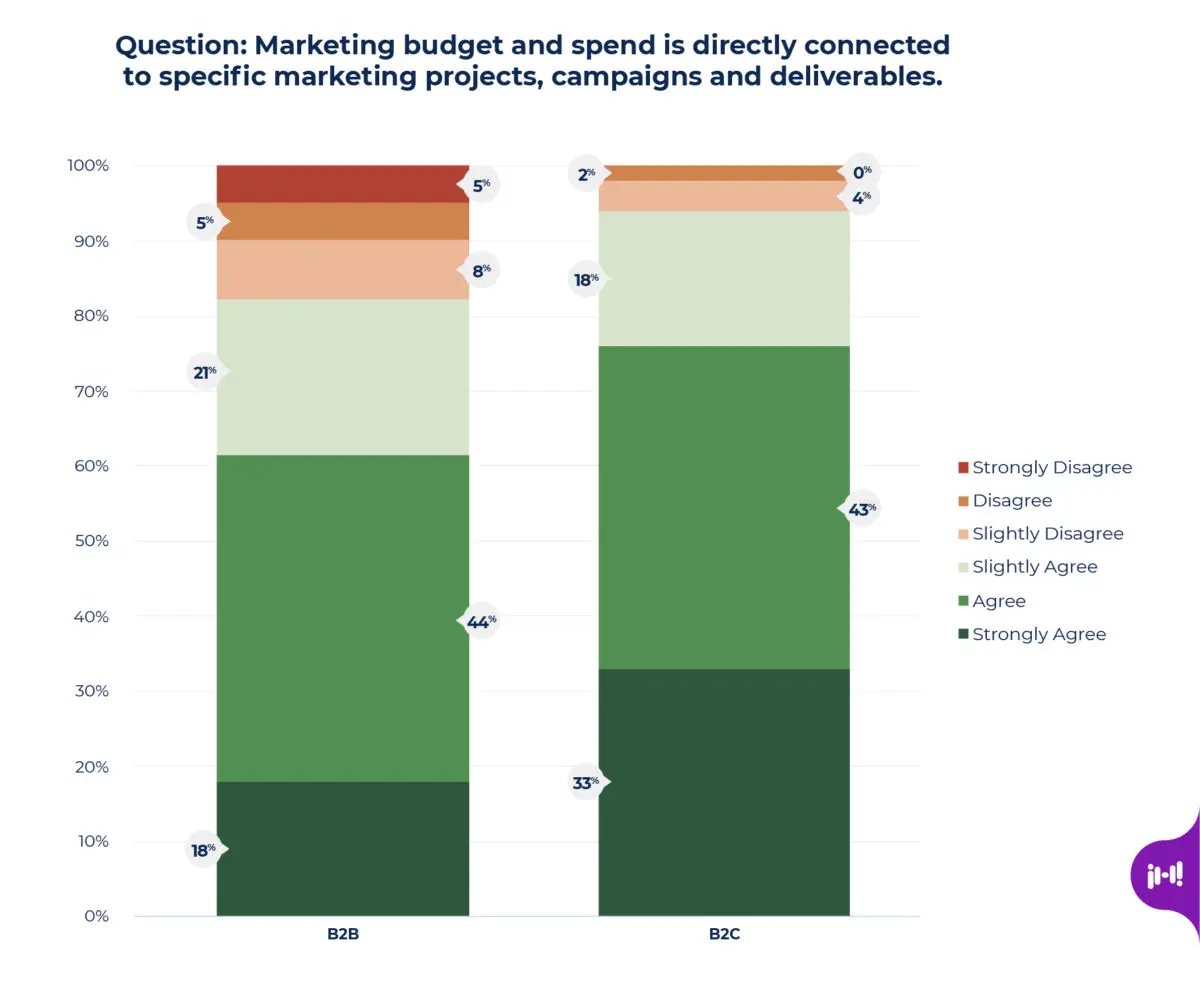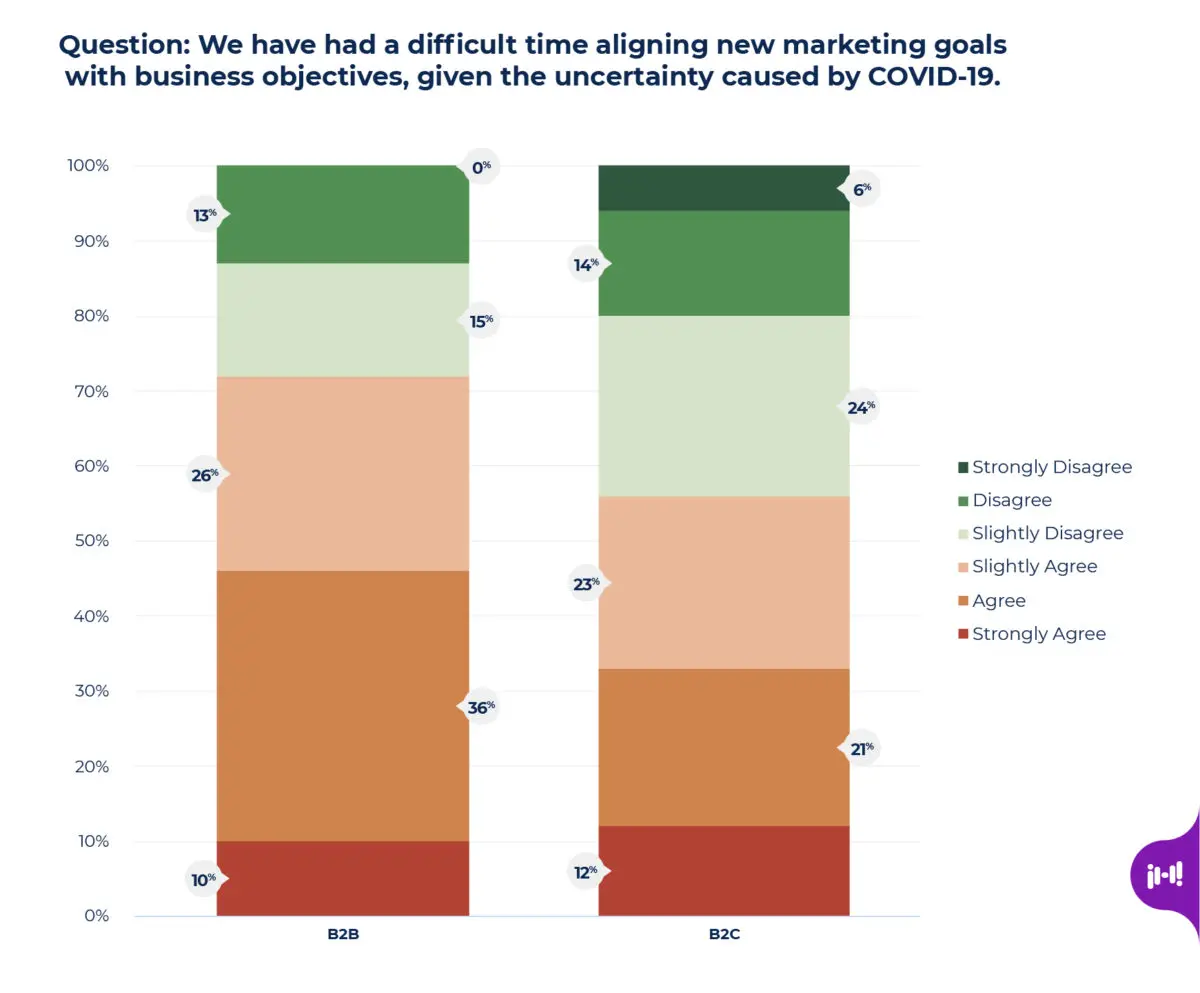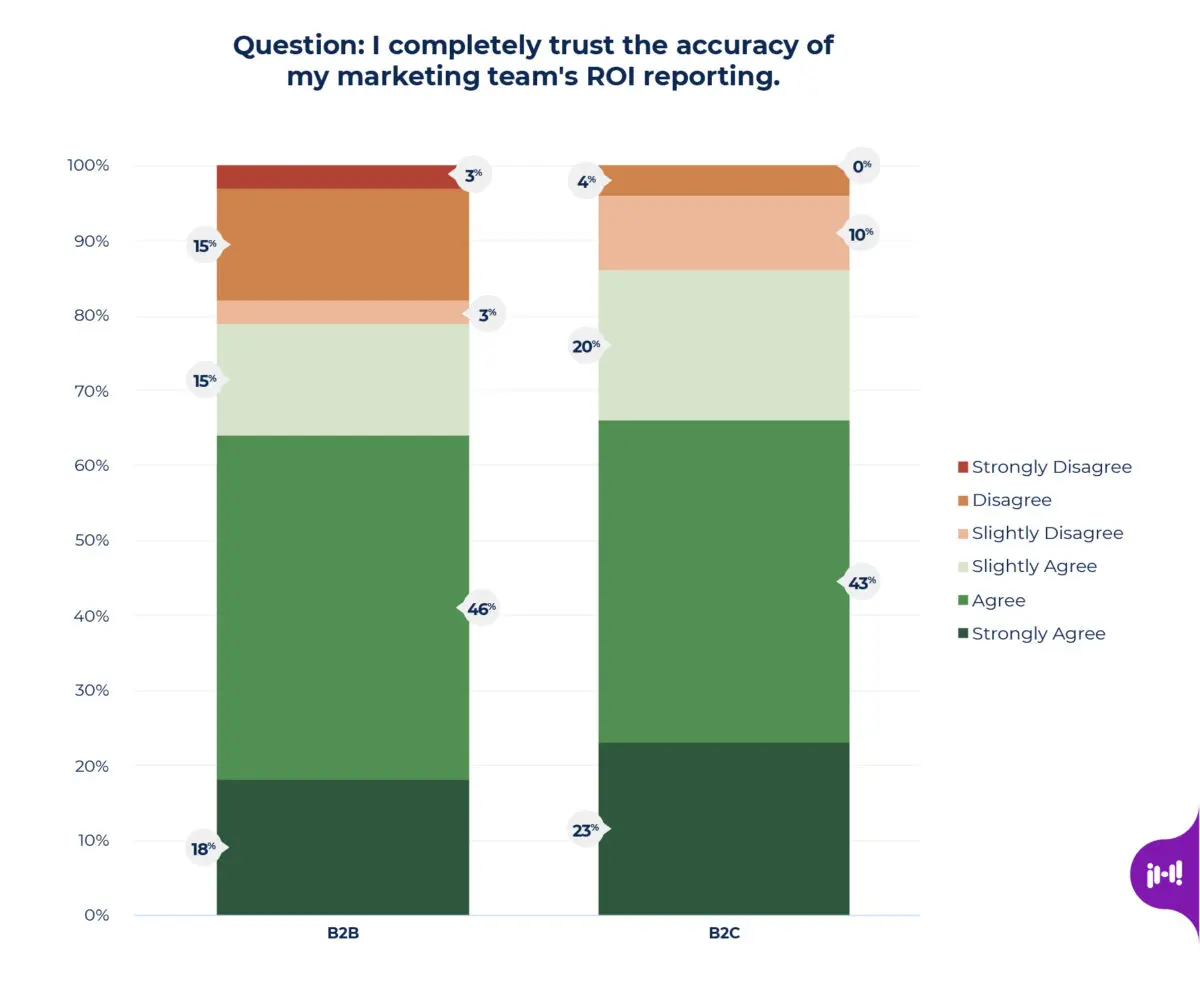Blog

Many characteristics influence the effectiveness and proficiency of a marketing team’s planning, budgeting, and measurement processes. One of the core delineating factors is company type.
Through our recent benchmark survey jointly conducted with Allocadia, we can state that marketing teams in B2C organizations are, on average, more advanced in marketing budgeting and planning than their counterparts in B2B. This divide was visible in the responses to every question posed in our survey. The three charts below illustrate this observation.
Precision of marketing budget and spend.

76% of B2C marketing teams agree or strongly agree that marketing budget and spend is directly connected to specific marketing projects vs. 52% agreement from their B2B counterparts. Also, note that 10% of B2B organizations disagree with this statement vs. just 2% of B2C.
THE NET
B2C marketing budgets are more tightly aligned to specific marketing projects.
Alignment of marketing goals with business objectives.

Read this question again. You don’t want to be in the strongly agree camp as that means you struggled to align marketing goals with business objectives in the wake of COVID-19.
46% of B2B marketing teams stated that they had a difficult time aligning new marketing goals with business objectives as a result of COVID-19. Just 33% of B2C marketers agreed. In addition, note that 20% of B2C strongly disagree or disagree with this statement vs. 13% of B2B.
THE NET
B2B marketing teams had a harder time aligning new marketing goals with objectives given the uncertainty caused by COVID-19.
Trust in marketing ROI reporting.

66% of B2C marketers state they completely trust the accuracy of their marketing team’s ROI reporting vs. 54% of B2B. Also of note is that 18% of B2B marketers strongly disagree or disagree with this statement vs. just 4% of B2C marketers.
THE NET
B2C marketing teams have higher confidence in their marketing reports.
Why are B2C marketers more advanced in planning and budgeting?
There are a number of reasons why B2C marketers tend to be more advanced in marketing budgeting and planning when compared to B2C. Three of the primary drivers relate to data, the buying process, and the power structure.
Data.
B2C marketing teams often benefit from a more robust data set and data structure than are typically found in B2B. This helps make marketing budgeting and planning more data-driven and intuitive. It’s also easier to apply analytics and report through business intelligence and visualization tools because of:
- More data. Speaking in broad terms, the marketing database sizes of most B2B organizations are dwarfed by their B2C counterparts. This helps on two fronts. First, there is more data, which helps in conducting statistical analysis, especially in micro-segments. Second, because B2C organizations frequently have significantly more customers, the impact of customer churn and deal slippage on projections is reduced.
- Less complex data model. In B2B, a product or service is sold to a company, where typically a buying center (multiple people) are involved in the purchase decision. In comparison, in B2C, a product or service is typically sold to and purchased by one person, and is at most reflected at a household level, so the data model tends to be less complex.
- Structured data. In B2B, more data is entered manually and therefore is reliant upon the data entry (or lack thereof) of quota-bearing sales reps. In B2C, data tends to be more digitized as sales and engagements are entered via ecommerce and point of sale (POS) systems. The net effect is normalized, consistently updated (in near real-time) data. The speed at which results are captured significantly impacts an organization’s ability to adjust marketing tactics to avoid shortfalls and maximize marketplace opportunities.
Buying process.
The buying process in B2C tends to be less murky and has a tighter tether between cause and effect than in B2B. This improves B2C’s ability to measure and report on marketing attribution. Key aspects of the B2C buying process that influence B2C’s ability in planning, budgeting, and forecasting include:
- Shorter duration. Excluding larger purchases like a house or an expensive car, the customer journey from awareness and education to selection and ownership tends to be shorter and tighter in B2C than in B2B. The condensed duration helps B2C marketing tightly correlate the impact of marketing tactics on revenue and do so in a shorter time frame.
- Marketing-centered. Outside the expensive, considered-good purchases mentioned above, B2C marketing is responsible for the entirety of prospect engagement. With limited or no marketing-to-sales handoff, contact, and sale (opportunity) records tend to be more complete and up to date.
Power structure.
In general, B2C marketing teams are more likely to be viewed as revenue producers instead of cost centers. In essence, the center of power in B2B is often the sales organization as they are most tethered to revenue. In comparison, in B2C, marketing is sales. There often is not a dedicated sales team and if there is, it’s made up of fewer commission-driven sales reps than in B2B. This has a tendency to drive a closer relationship between finance and marketing, something we saw in our survey, where B2C marketers rated significantly higher in the question, “Finance sees marketing as a strong partner and agrees it is a strategic department” than their counterparts in B2B. Why does this matter? When finance has a strong relationship with marketing and views it as a strategic department, they are less likely to see marketing budgets as expendable when there are revenue shortfalls—and B2C is leading in this regard.
The Iron Horse insight.
Most companies do not derive all of their revenue through one business model. Our survey results indicated that although most respondents were heavily skewed to either B2B or B2C, they frequently derived revenue from both. Here’s something to think about: If part of your revenue is driven from B2C and the rest is driven through B2B, are your marketing and budgeting processes consistent? It’s likely they are not. There’s probably a skew that subtly influences how your organization makes, measures, and optimizes marketing decisions. It’s prudent to be aware of and manage against this distortion.
Subscribe to our blog.
Get unstuck with the most interesting business ideas and our insights delivered to your inbox.